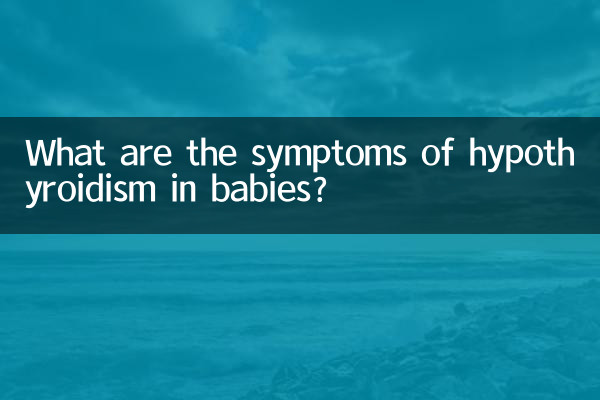What are the symptoms of hypothyroidism in babies?
Hypothyroidism (hypothyroidism for short) is a common endocrine disease that affects not only adults but also infants and young children. If a baby's hypothyroidism is not treated in time, it may affect his growth and intellectual development. Therefore, it is important to understand the symptoms of hypothyroidism in your baby. The following is a compilation of popular discussions and structured data on the symptoms of hypothyroidism in babies in the past 10 days across the Internet.
1. Common symptoms of hypothyroidism in babies

Symptoms of hypothyroidism in babies may vary depending on age and severity of the condition. The following is a common classification of symptoms:
| Symptom type | Specific performance |
|---|---|
| growth retardation | Slow growth in height and weight and delayed bone development |
| Skin and hair changes | Dry, rough skin, sparse hair, easy to break |
| Digestive system problems | Constipation, loss of appetite, difficulty feeding |
| neurological symptoms | Sluggish reaction, lethargy, weak cry |
| Other symptoms | Jaundice lasts for a long time, body temperature is low, and heart rate slows down |
2. Special manifestations of neonatal hypothyroidism
Neonatal hypothyroidism (congenital hypothyroidism) is usually detected soon after birth. The following are special manifestations of neonatal hypothyroidism:
| Symptoms | Description |
|---|---|
| Delayed resolution of jaundice | Neonatal jaundice usually resolves within 1-2 weeks, but may last longer in babies with hypothyroidism |
| hypotonia | The baby's body is relaxed and his activities are reduced |
| enlarged fontanel | Delayed closure of skull fontanelles |
| special face | Dull facial expression and enlarged tongue |
3. Diagnosis and treatment of hypothyroidism in babies
If parents find that their baby has the above symptoms, they should seek medical treatment in time. Doctors usually diagnose hypothyroidism in the following ways:
| diagnostic methods | Description |
|---|---|
| blood test | Test TSH (thyroid stimulating hormone) and T4 (thyroxine) levels |
| newborn screening | Most areas screen newborns for hypothyroidism |
| Imaging examination | Perform thyroid ultrasound or radionuclide scan if necessary |
In terms of treatment, babies with hypothyroidism usually need to take thyroid hormone replacement drugs (such as levothyroxine sodium) for life. Early treatment can significantly improve your baby's prognosis.
4. Things parents need to pay attention to
1.Regular review:During treatment, thyroid function needs to be monitored regularly and drug dosage adjusted.
2.Observe growth and development:Record the baby's height, weight, head circumference and other indicators, and seek medical attention promptly if any abnormalities are found.
3.Psychological support:Babies with hypothyroidism may have reduced learning ability, and parents need to provide more patience and encouragement.
4.Diet conditioning:Ensure balanced nutrition and appropriately increase iodine-rich foods (such as seafood).
5. Prevention and early intervention
Although congenital hypothyroidism is difficult to completely prevent, the following measures can reduce the risk:
| Precautions | Specific content |
|---|---|
| Pre-pregnancy check-up | Women preparing for pregnancy should have their thyroid function checked and treated if necessary |
| Nutrition during pregnancy | Ensure adequate iodine intake but avoid excess |
| newborn screening | Make sure your baby receives standard screening for hypothyroidism |
In short, the symptoms of hypothyroidism in babies are diverse, and parents need to pay close attention. Once hypothyroidism is suspected, the child should be taken to the hospital for examination as soon as possible. Early diagnosis and treatment are crucial to your baby's growth and development.

check the details

check the details